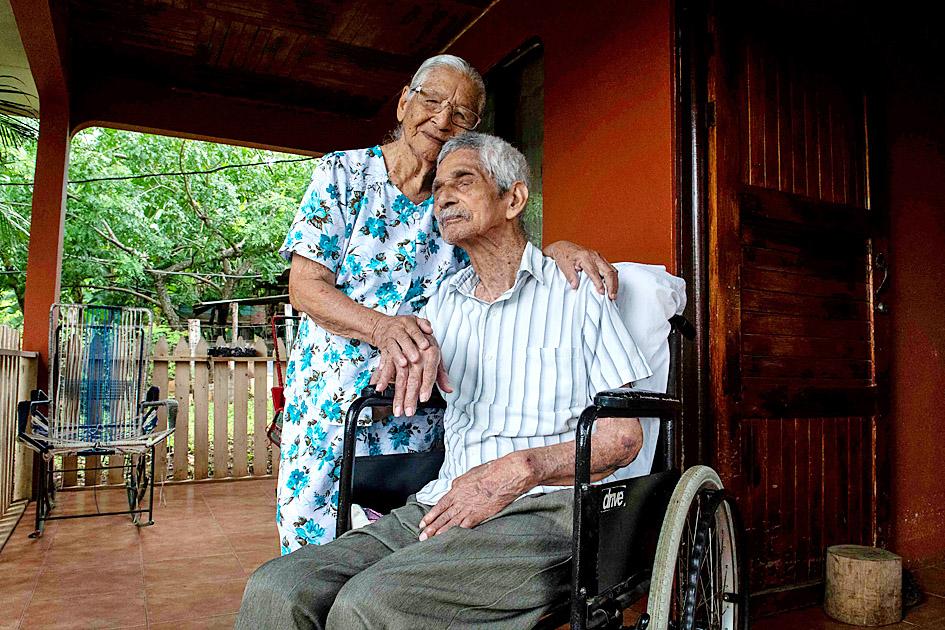Aged 94, Saturnino “Sato” Lopez rises early each day, chops wood and takes long walks in a part of Costa Rica that is a global oddity. Like him, people there tend to live a long time.
Home for Sato is the Nicoya Peninsula, where 1,010 people aged 90 or older live in a so-called “blue zone” — five areas around the world where life expectancy is particularly high.
These people did not move to the peninsula in the northwest of Costa Rica, they have always lived there.

Photo: AFP
“At my age, I feel well because the Lord gives me strength to walk at ease,” Lopez said. “I go out, walk maybe a kilometer or 4 kilometers, and I return, no problem.”
His house in a village called Dulce Nombre — or Sweet Name — is a sort of nature refuge.
The village’s wood, concrete and stick-and-mud houses are surrounded by vegetation, while cicadas drone non-stop.
“During the day if I have to sweep the patio, I sweep. If I have to chop wood, I chop, also. A bit of everything,” Lopez said.
In the late 20th century, demographer Michel Poulain and a physician named Gianni Pes used a blue marker to highlight on a map the Barbalia region of Sardinia, Italy, where they found that people lived a long time.
In 2005, an American author and National Geographic fellow Dan Buettner discovered similar characteristics in Loma Linda, California; Ikaria, Greece; Okinawa, Japan; and Nicoya.
So what is their secret?
“The main food is rice and beans. A bit of meat, fruit, avocado. That is what you eat. They say this is good food,” Lopez said.
His neighbors Clementina Espinoza, 91, and her husband, Agustin, 100, follow a similar diet.
Espinoza has outlived six of her 18 children. She walks slowly, but steadily, and still tosses corn to her chickens, prepares meals and washes up afterward.
She exhibits robust energy in a country where the life expectancy is a mere 80.
For the world in general, it is 72, the WHO says.
“Out in the countryside, life is quieter,” said Espinoza, insisting that diet is key. “You are more relaxed and there is not so much danger.”
Having goals is critical to aging well, said Aleyda Obando, who works in the social security administration in Nicoya. “They thank God for being alive and they make plans, to plant something or go see friends. It is a combination of factors that makes these people last longer.”
It also helps to have a social support network, exercise, eat healthy food and minimize stress.
“We grew corn, rice, beans, everything. We grew what we ate,” Clementina said.
Now, her daughter Maria looks after her.
Agustin, one of 53 people in the area who are 100 or older, is blind and had a stroke. Still, you can tell he likes it when Clementina caresses him.
Jose Villegas, another centenarian, lives in the neighboring village of San Juan de Quebrada Honda with one of his eight daughters.
Villegas is hoping that when he turns 105 on May 4 next year he can once again ride a horse.
He used to make his living on horseback, herding livestock, but sometimes he has trouble with his legs.
Being 104 “is a big deal, because God has given me a lot of life,” Villegas said.
“It was not fantastic, but it was not bad, either,” said Villegas, sitting in the house he was born in.
“Now, lifestyles have changed. It is not the same as before. Things used to be healthier and people loved each other a little bit more,” said Villegas, who became a widower seven years ago and spends his evenings listening to folk music.
Gilbert Brenes, a demographer at the University of Costa Rica, said that the blue zone’s elderly population might peak in the next 20 or 30 years and then decline.
Younger generations have different diets and face more obesity and diabetes, while fewer people grow what they eat.
However, Saturnino Lopez, a father of nine, remains active.
“My children say to me: ‘You no longer work. We have to work to support you,’ but I don’t like that, because I know what keeps me going,” he said, referring to physical activity like cutting wood. “Even if it is just a couple of blows with the machete, that’s enough.”

China on Monday announced its first ever sanctions against an individual Japanese lawmaker, targeting China-born Hei Seki for “spreading fallacies” on issues such as Taiwan, Hong Kong and disputed islands, prompting a protest from Tokyo. Beijing has an ongoing spat with Tokyo over islands in the East China Sea claimed by both countries, and considers foreign criticism on sensitive political topics to be acts of interference. Seki, a naturalised Japanese citizen, “spread false information, colluded with Japanese anti-China forces, and wantonly attacked and smeared China”, foreign ministry spokesman Lin Jian told reporters on Monday. “For his own selfish interests, (Seki)

VENEZUELAN ACTION: Marco Rubio said that previous US interdiction efforts have not stemmed the flow of illicit drugs into the US and that ‘blowing them up’ would US President Donald Trump on Wednesday justified a lethal military strike that his administration said was carried out a day earlier against a Venezuelan gang as a necessary effort by the US to send a message to Latin American cartels. Asked why the military did not instead interdict the vessel and capture those on board, Trump said that the operation would cause drug smugglers to think twice about trying to move drugs into the US. “There was massive amounts of drugs coming into our country to kill a lot of people and everybody fully understands that,” Trump said while hosting Polish President

Japan yesterday heralded the coming-of-age of Japanese Prince Hisahito with an elaborate ceremony at the Imperial Palace, where a succession crisis is brewing. The nephew of Japanese Emperor Naruhito, Hisahito received a black silk-and-lacquer crown at the ceremony, which marks the beginning of his royal adult life. “Thank you very much for bestowing the crown today at the coming-of-age ceremony,” Hisahito said. “I will fulfill my duties, being aware of my responsibilities as an adult member of the imperial family.” Although the emperor has a daughter — Princess Aiko — the 23-year-old has been sidelined by the royal family’s male-only

A French couple kept Louise, a playful black panther, in an apartment in northern France, triggering panic when she was spotted roaming nearby rooftops. The pair were were handed suspended jail sentences on Thursday for illegally keeping a wild animal, despite protesting that they saw Louise as their baby. The ruling follows a September 2019 incident when the months-old feline was seen roaming a rooftop in Armentieres after slipping out of the couple’s window. Authorities captured the panther by sedating her with anesthetic darts after she entered a home. No injuries were reported during the animal’s time on the loose. The court in the